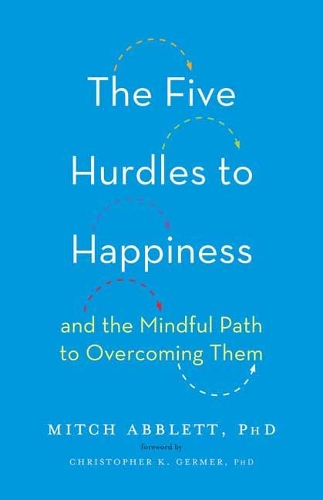
The Five Hurdles to Happiness: And the Mindful Path to Overcoming Them
(Hardback)
Available Formats
Publishing Details
The Five Hurdles to Happiness: And the Mindful Path to Overcoming Them
By (Author) Mitch Abblett
Shambhala Publications Inc
Shambhala Publications Inc
15th August 2018
United States
Classifications
General
Non Fiction
Mind, body, spirit: meditation and visualization
Mindfulness
Buddhism
158.1
Physical Properties
Hardback
272
Width 140mm, Height 216mm
Description
A practical approach to becoming aware of the "five hindrances"--the negative qualities that inhibit living the awakened life--and to breaking free of them in order to live more mindfully, effectively, compassionately. The Buddha's teaching on the five hindrances to awakening in the ancient scripture Samyutta Nikaya, where he contrasts them to the seven factors of enlightenment. They are a feature of what's taught in all the Buddhist traditions. Mitch Abblett gives the teaching a unique modern and secular interpretation, combining traditional wisdom with contemporary psychology--with examples from the lives of the real people he has worked with on the hindrances in his psychotherapy practice. The hindrances are, according to Mitch's formulation (there are various others)- desire, hostility, sluggishness, worry, and doubt. Recognizing how each hindrance manifests in you goes a long way toward freeing yourself from it, but each hindrance also has a corresponding antidote that works like a wonder drug prescribed for a specific illness. The book takes the Buddhist five hindrances beyond their application to meditation and uses them as a frame for engaging readers in a process of contemplating their own life in general and learning to turn into their experience rather than merely repeating bad habits.
Reviews
This is a lovely, profound book. It takes the Buddhas ancient teachings about the five primary blocks to happiness and inner peace and applies them to our modern, busy, stressful lives. Grounded in science, informed by the penetrating insights of an experienced therapist, and practical on every page, this heartfelt book will help change many lives for the better.Rick Hanson, PhD, author ofResilient: How to Grow an Unshakable Core of Calm, Strength, and Happiness
Full of engaging, provocative insights based on years of both psychological and spiritual practice, Dr. Abblett brings to life the Buddhas insights into how our minds create suffering and how we can transform this suffering into wisdom and compassion. Written with unusual honesty and wit, and full of practical examples and exercises, this book helps us let go of the self-protective habits that make us unhappy, and cultivate instead open, awakened, hearts and minds.Ronald D. Siegel, PsyD, author of The Mindfulness Solution: Everyday Practices for Everyday Problems
An honest and compassionate manual for relaxing the grip of our conditioned reactions. With humor and practical clarity, Mitch Abblett illuminates the painful responses we reinforce every day and offers kinder practices in returnones that support the gradual, skillful process of opening our hearts.Sharon Salzberg, author of Lovingkindness and Real Love
Clinical psychologist Abblett (The Self-Compassion Deck) provides a handy and humorous guide to using mindfulness to overcome the five hindrances of Buddhist traditionunconscious habits that envelop the mind, create obstacles to a happy life, and limit potential.With numerous meditation practices included, this is a comforting guide for mindfulness practitioners and lay people alike.Publishers Weekly
Drawing in his rich clinical experience and sound research, Abblett offers the heartfelt wisdom of mindfulness delivered in practical, easy-to-implement practices that will help anyone move beyond the self-protective patterns that keep us unhappy and into a much richer, more fulfilling, and happier life.Psych Central
Author Bio
MITCH ABBLETT, PhD, is a licensed clinical psychologist and consultant with a private practice. He speaks and trains nationally and internationally on the applications of mindfulness for enhancing professional and personal communication patterns. The author of several previous books, he has been the executive director of the Institution for Meditation and Psychotherapy and was for 11 years clinical director of Manville School at Judge Baker's Children's Center at Harvard University.
